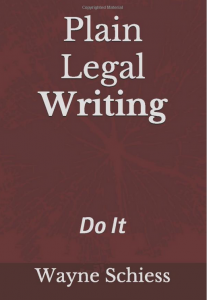“The constitutional amendment authorizing the legislature to provide for the reduction of the amount of a limitation on the total amount of ad valorem taxes that may be imposed for general elementary and secondary public school purposes on the residence homestead of a person who is elderly or disabled to reflect any statutory reduction from the preceding tax year in the maximum compressed rate of the maintenance and operations taxes imposed for those purposes on the homestead.”
Category Archives: Plain English
Leave Behind These Words and Phrases

Here are nine legal words and phrases we can do without.
My books: Legal Writing Nerd: Be One, Plain Legal Writing: Do It
This post is part of my effort to pull legal vocabulary into 2020. We certainly don’t need to sound as though we’re writing in 1908, let alone 1708. So here are a few legal words and phrases we can leave behind.
comes now
A lawyer once asked me to settle a debate at the office: “If there’s one plaintiff, it’s ‘COMES NOW Rodney Jackson, …’ But if there are two plaintiffs, shouldn’t it be ‘COME NOW Rodney and Melinda Jackson, …’?” Of course, I replied that the correct answer was to stop beginning pleadings with this archaic phrase. And drop the ALL-CAPS.
Yet more than a dozen lawyers have told me over the years that they choose to retain comes now in court filings. Why? The convention is so deeply entrenched, they say, that omitting comes now could make them look like novices—like lawyers who don’t know how things are done. I grant the concern but it saddens me a bit.
hereinabove, hereinafter
Almost all the here– words should go (herein, hereto, hereby, etc.) but these two are the most annoying. They’re old, they’re often vague, and they’re multi-syllabic. The legal-word expert Adam Freedman says that they arose from “experimentation. Lawyers and other literate folk enjoyed nothing better … than inventing new words by putting together two or more old ones.”[1] Sometimes you can just omit them, sometimes you can use above and below, and sometimes you can specify what you’re referring to and where to find it.
inter alia
Latin phrases that aren’t terms of art, as this one isn’t, ought to be dropped: vel non, sub judice, sua sponte, and others. Use an everyday-English equivalent: and others, among others, or among other things.
instant case
I still remember the sad look on a third-year student’s face when I suggested that he use this case, the current case, the Jackson case, or even here in place of the instant case. “But the instant case sounds so … legal,” he said. All right. It’s often important for a novice to “sound legal.” But an experienced lawyer can abandon archaic language.
–trix suffix words: administratrix, executrix, prosecutrix, testatrix
In 1992, a legal-language expert named David Mellinkoff said these forms were “dying.”[2] We can no longer wait around. Kill them off now. They’re sexist, archaic, and hard to pronounce.
in witness whereof
Harmless—but go ahead and delete this phrase from your form document.
wherefore, premises considered
Standard—but what does it mean? If it means “In light of everything just stated …” why not use “Therefore …”?
know all men by these presents
I’ll let someone else handle this one: Anyone who uses this phrase is an “unregenerate dinosaur” according to legal-drafting expert Ken Adams.[3]
witnesseth
This word has no place in modern legal drafting. If you prepare transactional documents, and you’re afraid to take it out, be brave. And look it up: you don’t have to take my word for it. Bryan Garner calls it an “antiquated relic.”[4]
For further guidance on outdated and useless legal words, see
- Kenneth A. Adams, A Manual of Style for Contract Drafting
- Adam Freedman, The Party of the First Part: The Curious World of Legalese
- Bryan A. Garner, Garner’s Dictionary of Legal Usage
- David Mellinkoff, Mellinkoff’s Dictionary of American Legal Usage
My books: Legal Writing Nerd: Be One, Plain Legal Writing: Do It
_____
[1] Adam Freedman, The Party of the First Part: The Curious World of Legalese 25 (2007).
[2] David Mellinkoff, Mellinkoff’s Dictionary of American Legal Usage 600 (1992).
[3] Kenneth A. Adams, Know All Men By These Presents, Adams on Contract Drafting, https://www.adamsdrafting.com/know-all-men-by-these-presents/
[4] Witnesseth, Black’s Law Dictionary 1839 (10th ed. 2014)
And you think legal writing is bad?
My books: Legal Writing Nerd: Be One, Plain Legal Writing: Do It.
Operations within the Sector Franchise Fund were impacted by the June 20, 2018, AS-PTT Memorandum, Customer Approval Process for the Sector Business Center, directing AOD to divest external customers, as well as the review and denial of particular requests for assisted acquisition support from external customers including the planned divestiture of AOD’s 5 largest customers: TARCA, CARCA, TICOM, VCDo, and DOTS&R.
In response to the AS-PTT direction and review process, AOD did not conduct its usual business development efforts, existing customers were confused by the approval process and lost confidence in AOD’s ability to continue to perform assisted acquisition support for external customers, AOD’s hiring freeze led to 40 departures which have not been backfilled impacting the ability to seek and perform new work and certain existing customers did not send additional work to AOD.
Overall, FY 2018 AOD actions decreased 9% and obligations decreased 22.5% over FY 2017 and Quarter 3 and 4 revenue within the EFFL represented a $16.8M decrease in FY 2018 compared to FY 2017. Disapproval of requested acquisition support led to a direct loss of $5.1-$5.9M (Tab A) in revenue for AOD. Additional revenue was likely lost due to existing and potential customers not reaching out to AOD for support as rumors that AOD would no longer be servicing external customers circulated in the shared service community. As a result, AOD generated less revenue than projected, expenses slightly exceeded revenue, the EFFL Annual Reserve was funded below optimal levels and AOD did not generate enough revenue to contribute to the Sector Franchise Fund Capital Improvement Reserve.
- Average sentence length = 43 words
- Flesch Reading Ease Score = 0.0 (scale of 0-100 with 60 being “plain”)
- Flesch-Kincaid Grade Level = 24 (high school plus 12 years of education)
My books: Legal Writing Nerd: Be One, Plain Legal Writing: Do It.
New book: Plain Legal Writing: Do It
I’m pleased to announce the publication of my latest book: Plain Legal Writing: Do It
Sometimes, lawyers write for other lawyers: supervisors, judges, opposing counsel, and more. But sometimes lawyers write documents they know must be read and understood by those without legal training. These are documents such as advice letters, home mortgages, credit-card agreements, divorce decrees, liability waivers. If you write legal content for nonlawyers, this book is for you. It shows you, step by step, how to produce plain-English documents, and it’s particularly useful if you’re working from a form or template written in traditional legalese.
And this one:

